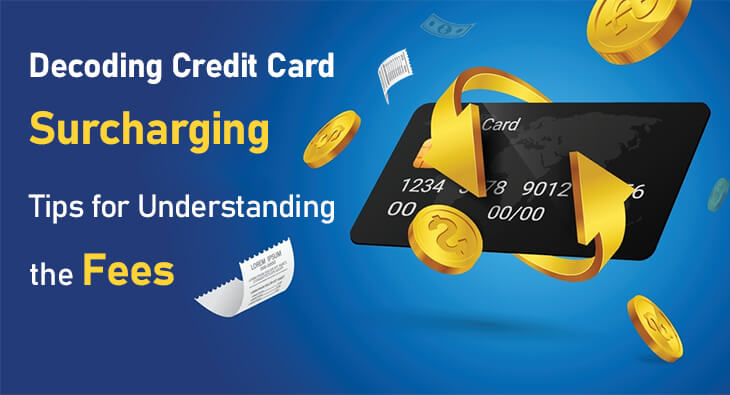Credit Card Surcharging is becoming an increasingly common practice among businesses of all sizes. It involves adding an additional fee to the cost of goods and services if the customer chooses to pay with a credit card. While some businesses may view surcharging as a way to help offset the fees associated with processing credit cards. It is important to understand the legal implications and regulations surrounding this practice before implementing it. In this blog post, we’ll take a closer look at Credit Card Surcharging and provide some tips for understanding the fees associated with it.
What is credit card surcharging?
Credit card surcharging refers to the practice of adding an additional fee to the total cost of goods and services when a customer chooses to pay with a credit card. This fee is intended to offset the fees associated with processing credit card transactions.
Merchants often implement surcharging as a way to maintain their profit margins while still accepting credit card payments. By passing on the cost of processing fees to customers, businesses can alleviate the financial burden associated with these fees.
However, it is important to note that credit card surcharging is subject to regulations and legal implications. Some jurisdictions prohibit or restrict surcharging, while others have specific requirements for businesses that choose to implement this practice.
Understanding the ins and outs of credit card surcharging is crucial before deciding to surcharge customers. In the following sections, we will delve deeper into the reasons behind surcharging, the potential costs involved, and the rules and regulations surrounding this practice.
Some Related Blogs
- Get More Out of Your Merchant Account for Your Small Business
- Mastercard’s Guide to High Risk Recurring Billing
- The Essential Guide to Payment Processing for CBD & Hemp Sales
- Breaking Down the Rapid Growth of the Credit Card Industry in 2023
Why do merchants charge a surcharge on credit card transactions?
Merchants charge a surcharge on credit card transactions for a variety of reasons. One of the main motivations is to offset the costs associated with processing credit cards. When a customer pays with a credit card, the merchant must pay a fee to the card issuer for processing the transaction. This fee can range from a small percentage of the transaction amount to a fixed fee per transaction. By passing on this cost to the customer, the merchant can maintain their profit margins and avoid taking a hit to their bottom line.
Another reason for surcharging is to incentivize customers to use alternative payment methods that may be cheaper for the merchant, such as debit cards or cash. By adding a surcharge to credit card transactions, merchants can encourage customers to choose these alternative payment methods. Which can result in lower fees for the merchant.
It’s important to note that while surcharging can benefit merchants financially. It is subject to regulations and legal implications. Understanding the reasons behind surcharging can help merchants make informed decisions about implementing this practice and ensure compliance with relevant laws and regulations.
How much can you be charged for a credit card surcharge?
When it comes to credit card surcharges, the amount you can be charged varies depending on the merchant and the jurisdiction. The fee can range from a small percentage of the transaction amount to a fixed fee per transaction. It’s important to note that some jurisdictions have specific regulations in place regarding surcharges, including capping the maximum fee that can be charged.

To get a better understanding of the potential costs involved, it’s always a good idea to check with the merchant or consult the local regulations. Additionally, it’s worth noting that certain credit card networks, such as Visa and Mastercard, have their own rules and restrictions on surcharging. Which may further impact the amount you can be charged.
Being aware of the potential fees associated with credit card surcharging can help you make informed decisions when choosing your payment method. It’s always a good idea to compare the surcharge fees with the convenience and rewards offered by using a credit card to determine the best option for your specific situation.
What are the rules and regulations around credit card surcharging?
When it comes to credit card surcharging, it’s essential to be aware of the rules and regulations in your jurisdiction. While some jurisdictions may prohibit or restrict surcharging, others have specific requirements that businesses must adhere to if they choose to implement this practice.
One important aspect to consider is that certain credit card networks, such as Visa and Mastercard, have their own rules and restrictions on surcharging. These rules can impact the amount you can be charged and the specific requirements that must be met.
To ensure compliance with the regulations surrounding credit card surcharging. It’s crucial to do your research and consult local laws. Understanding the rules and regulations will help you navigate this practice and avoid any potential legal issues or penalties.
By staying informed and complying with the relevant rules and regulations, you can confidently implement credit card surcharging in a way that is both legal and beneficial for your business.
Tips for avoiding credit card surcharges.
Now that you have a better understanding of credit card surcharging and the potential fees involved. Let’s explore some tips for avoiding these surcharges.
1. Research payment options: Before making a purchase, take the time to research different payment options accepted by the merchant. Some businesses may offer discounts or incentives for using alternative payment methods, such as cash or debit cards, which can help you avoid credit card surcharges.
2. Negotiate with the merchant: If you frequently shop at a particular store and are concerned about credit card surcharges, consider speaking with the merchant directly. They may be willing to waive or reduce the surcharge for loyal customers or for larger purchases.
![]()
Email us anytime!
Email customer service 24/7
![]()
Call us anytime!
Reach customer care 24/7 at +1 (727) 330-3944
3. Consider using payment apps: Many payment apps, such as Apple Pay or Google Wallet, offer convenience and security while allowing you to avoid credit card surcharges. These apps link directly to your bank account or a prepaid card, providing a seamless payment experience.
4. Look for promotional offers: Keep an eye out for promotional offers or discounts that merchants may offer to incentivize credit card payments. They may occasionally waive surcharges or provide special deals for customers who use credit cards.
5. Choose merchants that do not surcharge: Not all businesses impose credit card surcharges, so consider supporting those that do not add extra fees. Look for signs or ask the merchant directly if they have a policy against surcharging.
Remember, the key is to be informed and proactive when it comes to credit card surcharges. By exploring different payment options, negotiating with merchants, and staying on top of promotions, you can minimize the impact of these surcharges on your wallet.
Alternatives to paying with a credit card.
While credit cards are a convenient payment method for many, there are alternatives available if you want to avoid credit card surcharges. One option is to use cash or a debit card for your purchases. By paying with cash, you eliminate the need for any additional fees associated with credit card transactions. Another alternative is to use mobile payment apps such as Apple Pay or Google Wallet.
These apps allow you to link your bank account or a prepaid card and make secure and seamless payments without incurring any surcharges. Additionally, you can look for merchants that do not surcharge customers for using credit cards. Some businesses have policies in place to provide a surcharge-free shopping experience. Finally, it’s always worth checking if a merchant offers any promotional offers or discounts for credit card payments, as these can help offset any surcharges. Exploring these alternatives can help you save money and avoid unnecessary fees when making your purchases.



